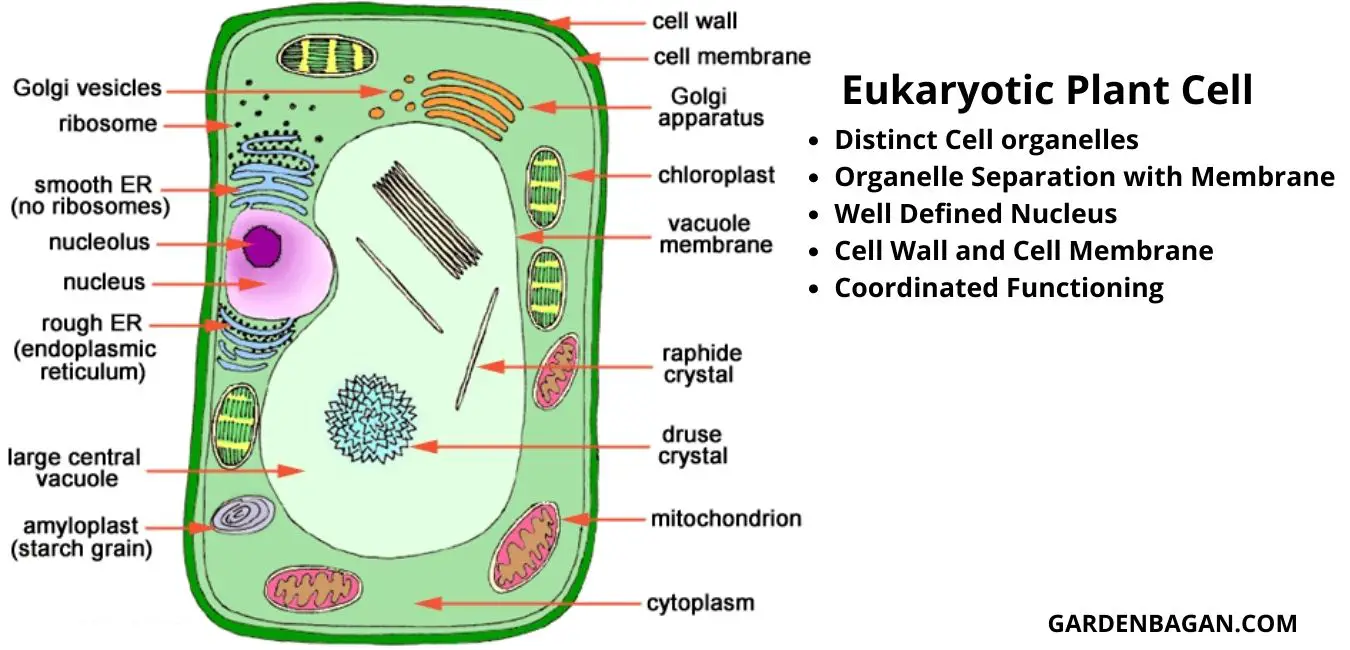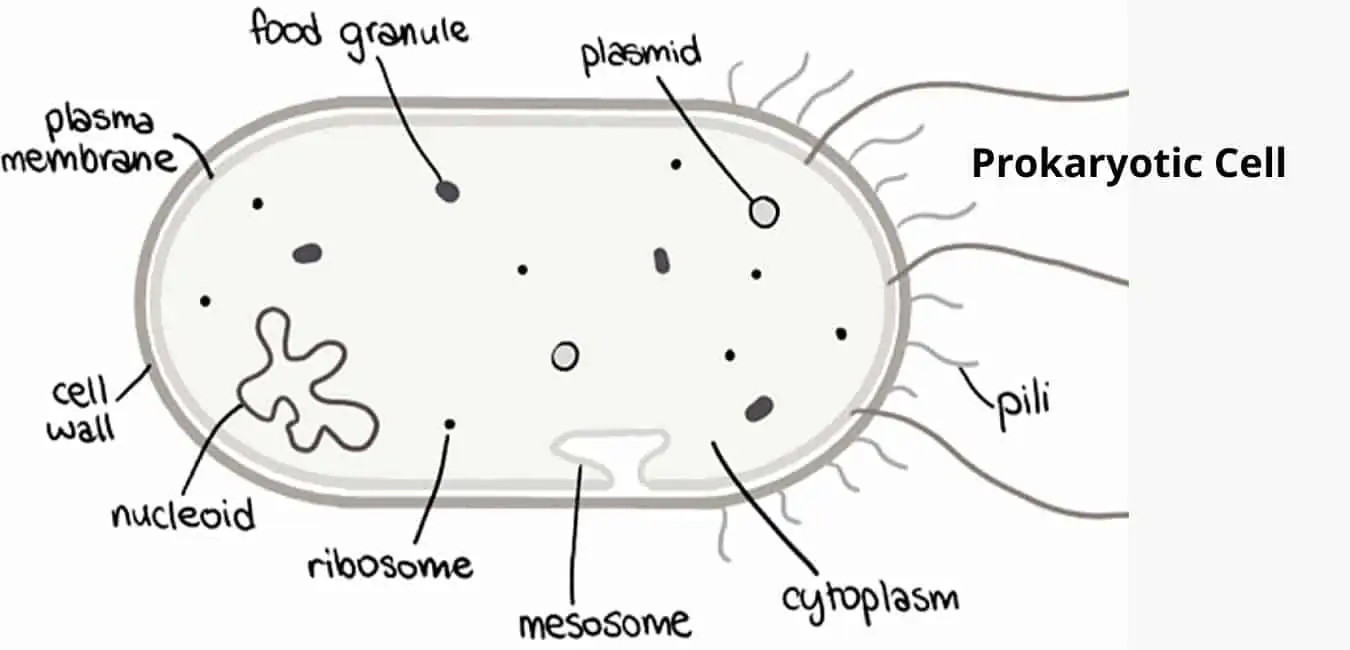A plant cell is an interesting structure to understand. Today we are discussing the nature of these cells. Do you know whether plants are Eukaryotic or Prokaryotic? Are you aware of Eukaryotes and Prokaryotes? If not then follows us in this article. We will try to explain everything in a simple easy-to-understand manner.
First of all, you should know that Prokaryotes and Eukaryotes are cells with specific characterizations. They are differentiated based on their shape both internally and externally. The presence or absence of specific cell organelles makes them different.

Check out my previous post: Everything to Know about Chromatin In Plant Cell
Are plants Prokaryotic?
No Plants are not Prokaryotic. Every plant cell has a chloroplast that contains chlorophyll. It doesn’t matter whether you see it or not. If it is a plant cell then it must have a membrane-bound chloroplast.
Prokaryotes on the other hand don’t have any distinct cell organelles except Thylakoids. Even Thylakoid is not present in every cell prokaryotic cell. These primitive cells don’t have any cell organelles or true nuclei. All the genetic material like DNA or RNA floats inside the cell body. Prokaryotic cells have a single layer of cell membrane outside the cell body.
Most of the prokaryotes are primitive unicellular organisms. We can’t see them with naked eyes. Therefore, A plant can not be classified as a Prokaryote. They are multicellular organisms with distinct cell structures.

Read more about: Can You Plant a Whole Strawberry?
Are Plants Eukaryotic?
Yes, Plants have Eukaryotic cells. The term Eukaryotes is used to define any eukaryotic cell.
As an opposite companion of prokaryotes, A Eukaryotic has a well-developed cellular structure. These cells have a multi-layer membrane for the cell organelles as well as the entire cell covering.
The internal cellular functions in a eukaryotic cell are assigned to distinct cell organelles. You can understand a cell organelle as rooms for specific functions.
Suppose a cell is like your home. Then there must be some walls, doors, storage area, kitchen, bathroom, and living room for every member of the house. Just like that, a eukaryotic cell has specific sections or compartments for predefined functions.
The most important section is the Nucleus of the cell. All the essential genetic information is stored inside the nucleus of the cell. A eukaryotic cell has well-defined and structured nuclei. It has a protective nuclear membrane around it.
Similarly, a eukaryotic plant cell has several organelles inside it. Some of the important cell organelles in a plant cell are- Chloroplast, Mitochondria, Vacuoles, ER, Golgi body, and the Nucleus.
Are All plants made up of eukaryotic cells?
All visible green vegetation including the fungi is made of Eukaryotic cells. Although there are some exceptions in a unicellular organism. Yet it is fair to state that All plants are Eukaryotes.
Even microscopic cells with distinct chloroplast or other organelle is a eukaryotic cell. Therefore, we can say that all plants are made up of eukaryotic cells.
Check out Books and Study materials on Amazon.
Why are plants eukaryotic cells?
We have already said that All plant cells are eukaryotic. Now if this is true then why are plant eukaryotes. You should ask why should we consider plants as eukaryotic.
Do you know the Answer? No, don’t worry keep reading for details.
A plant has millions of cells in its body. Some of them form the flower, fruit, and seeds while some form the leaves, stem, bark, roots, and all other plant parts. You can make a clear distinction in their function. These are the visible aspect of eukaryotic cells in any plant.
Every Plant cell is unique with unique functions. Therefore, they have a different cellular structure. Cell walls and the cell membrane are common in all of these plant cells. Another similar cell organelle is the Chloroplast that creates chlorophyll. Chlorophyll is the green-colored pigment responsible for green coloring in plants. Separate cell organelle structure is a characteristic of eukaryotic cells.
You can observe separate Nucleus, mitochondria, chloroplast, Vacuoles, and ER floating in the cytoplasm of a plant cell. All of these cell organelles have membrane cover that separates them from others.
Are All plants eukaryotic organisms?
Yes, all plants are eukaryotic organisms. First of all, plants are living things so it is good to consider their organisms. Next, each plant cell has a distinct nucleus and other organelles. It has two layers of outer protection.
The eukaryotic plant cell is covered with a thin soft cell membrane which is again protected by a semi-permeable hard cell wall. The multi-layer protection in a plant cell is a feature of eukaryotic cells.
Are seedless plants Eukaryotic?
Definitely, All seedless or seeded plants are Eukaryotic. In fact, A seed itself has millions of cells with specific features. Each of the cells in the seed has a distinct cell wall and cell membrane.
Even if a plant does not bear fruit or seed. Still, it is a multicellular organism where all cell works with proper coordination.
Different types of cells perform different functions in a plant. This differentiation suggests higher order of organization with the multicellular organism-Plant.
All of these characteristics suggest any plant whether seeded or seedless are Eukaryotic.
Are Most Plants Eukaryotic?
Yes, most of them are Eukaryotic. In fact, if I am right then every visible multicellular plant is Eukaryotic. The differentiation of functions at the cellular level is a distinction for Eukaryotes over prokaryotic cells.
Prokaryotic cells are individual functioning primitive cellular bodies with no internal organization. Every essential genetic information in the form of DNA clusters floats in the cytoplasm. There is no membrane to separate these from mixing.
Eukaryotic cells have better organization than prokaryotes. These cells can coordinate and work as a group. A group of eukaryotic cells can fulfill specific tasks for the plant. Hence Eukaryotes are more developed than prokaryotic cells.
All of the visible and functional variations in the plant kingdom are due to the evolution of eukaryotic cells. Every multicellular organism whether Plant or Animal is made up of Eukaryotic cells.
